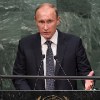![]()
Sat, April 23, 2011 | Rubin Reports | By Barry Rubin
Who Makes U.S. Policy? UN, Arab League, international community or U.S. Government?
This interview with Secretary of State Hillary Clinton deserves close analysis for a reason that neither I nor anyone else noticed before.
Question: “But, I mean, how can [Libya] be worse than what has happened in Syria over the years, where Bashar Asad’s father killed 25,000 people at a lick? I mean, they open fire with live ammunition on these civilians. Why is that different from Libya?”
Secretary Clinton: “Well, I…”
Question: “This [Syria] is a friend of Iran, an enemy of Israel.”
Secretary Clinton: “Well, if there were a coalition of the international community, if there were the passage of Security Council resolution, if there were a call by the Arab League, if there was a condemnation that was universal — but that is not going to happen, because I don’t think that it’s yet clear what will occur, what will unfold.”
On one hand, what Clinton says is quite logical. It doesn’t make sense for Western countries to send forces to Syria and start bombing. But that’s not the issue. The issue is about supporting the Syrian opposition and really comprehending that Syria is an enemy of America whose regime deserves no quarter.
Yet what does Clinton begin with as the reasons for treating the two differently? Let’s list them:
1. “a coalition of the international community”
2. “passage of Security Council resolution”
3. “call by the Arab League”
4. “a condemnation that was universal”
But, she correctly concludes, “that is not going to happen.”
Now, this is no way for a U.S. secretary of state to speak. What about U.S. interests? What about an independent American decisionmaking process?
Again, these steps might be appropriate for military action — which, again, is not the issue here — but let’s recall, for example, how President George Bush set U.S. policy on Iraq’s invasion of Kuwait in 1990 and then put together an international coalition on the basis of decisions made on the basis of U.S. national interests. That’s the way it’s supposed to work. Not the other way around.
Since Syria is an American enemy killing Americans in Iraq and backing terrorist groups to a degree exceeded only by Iran — which is its ally and also an enemy of the United States — why does the U.S. government need an international coalition, UN resolution, Arab League call, and universal condemnation to act?
At any rate, this kind of things certainly does not apply for taking a strong U.S. stance of diplomatic opposition, freezing all the concessions this administration has given to Syria, recalling the U.S. ambassador in protest, building an anti-Syria alliance, blocking Syria’s takeover of Lebanon, working actively to eliminate Syria’s Gaza client, supporting the Syrian opposition and trying to bring down the regime, punishing Syria for its surrogate warfare against the United States in Iraq, and so on.
But instead the kind of thinking this administration all too often represents turns over U.S. power and sovereignty to others.
Every American secretary of state from 1789 onward would be shaken and shocked by such thinking. They would say: No, the United States determines its interests, sets its policy, and implements that policy. Getting international support is an element in that process but it is a byproduct of U.S. interests and decisionmaking; not the other way around.
It is preferable that the United States act multilaterally if possible, but it is not the precondition for action either. Nor should trying to maximize foreign support require too much watering down of the measures taken or — in the case of the Iran sanctions — smoothing passage by giving exemptions to Russia, China, and other countries thus gutting the sanctions.
Similarly, the U.S. government should not become so obsessed with international popularity and multilateralism as to ignore it when countries stab it in the back, as Turkey’s government did on the UN sanctions issue. Nor should it bring situations, as is happening with the unilateral Palestinian independence issue at the UN, in which the United States opposes something as dangerous but doesn’t lobby energetically with other countries on it.
During the Cold War, the United States usually acted with coalitions under president after president. Even the supposedly obsessive unilateralist President George W. Bush put together an international coalition to invade Iraq.
Yet now broad international support has in many cases become the precondition for U.S. action or indeed formulating a U.S. policy at all. In other cases, the U.S. government refuses to take leadership as if such behavior was a demonstration of high virtue. This kind of thing has become so common as to be accepted without anyone even noticing.



 RSS
RSS











Who Makes U.S. Policy? #UN, #Arab League, international community or U.S. Government? | #tcot #Clinton http://j.mp/elDkMc
RT @CrethiPlethi: Who Makes U.S. Policy? #UN, #Arab League, international community or U.S. Government? | #tcot #Clinton http://j.mp/elDkMc
RT @CrethiPlethi: Who Makes U.S. Policy? #UN, #Arab League, international community or U.S. Government? | #tcot #Clinton http://j.mp/elDkMc